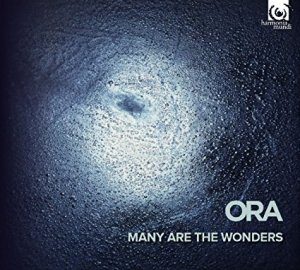My strategy for listening to this recording, which primarily consists of works by Thomas Tallis, interspersed with six newly commissioned pieces designed to give a contemporary “response” to specifically assigned pieces, was not to look at the track list beforehand, consulting the liner notes only if and when I heard somethng especially attention-getting, for better or worse. As it turned out, I was checking out the notes on almost every track, particularly regarding the new works, because most of them were, well, attention-getting, and mostly in the best sense.
I had heard Steven Stucky’s dynamic setting of O sacrum convivium before (Choir of Trinity College Cambridge)–it’s one of two contemporary selections on the program that weren’t commissioned for the project, the other being Bob Chilcott’s double-choir arrangement of Tallis’ famous Canon; Stucky’s O sacrum is one of three motets written “In Memoriam Thomas Tallis”, and it’s a masterful play on the rhythms and sounds of the text. The Chilcott piece doesn’t do much or go anywhere–instead it effectively captures the spirit of the original in a kind of floating wall of sound.
As mentioned, most of the newly commissioned works are worthy of consideration by fans of new choral music, but especially those by Frank Ferko, whose moving, modern Reflection on Thomas Tallis’ If ye love me captivates with its scintillating harmonies; Alec Roth, who colorfully depicts his deeply felt connection to Tallis’ compline hymn Te lucis ante terminum; and Harry Escott, whose own O light of Light is the most adept and successful among the six new pieces, with its imaginative use of melodic bits and harmonic references to Tallis’ O nata lux.
On the other hand, Richard Allain’s Videte miraculum, which begins with a catchy thematic idea and offers some other interesting moments along the way, at more than 10 minutes is about six minutes too long for its material; and Ken Burton’s Many are the wonders (a reflection on the responsory Loquebantur variis linguis, which recounts the incident at Pentecost, described in the book of Acts, in which the apostles spoke in tongues), intriguingly begins as a sort of gospel-style setting, a fine enough idea, but it all-too-soon loses its way, unsure of what exactly it wants to say or how it wants to say it.
While you could argue that the nine Tallis psalm-tune settings are not themselves compelling program material, they are certainly well sung here and provide important and necessary context for the other works, among them especially lovely renditions of O nata lux and If ye love me, the latter performed by eight male voices as simply and affectingly as you’ll ever hear. The 20-voice ensemble led by Suzi Digby delivers consistently fine, sensitive performances and demonstrates a requisite mastery of style and technique. Also worth mention are the excellent notes–by John Milsom, describing the marvels and mysteries of Tallis’ music–and those by each composer giving valuable insight into his own work. And another bonus for choral directors: a listing of publishers and sources for each piece!
































